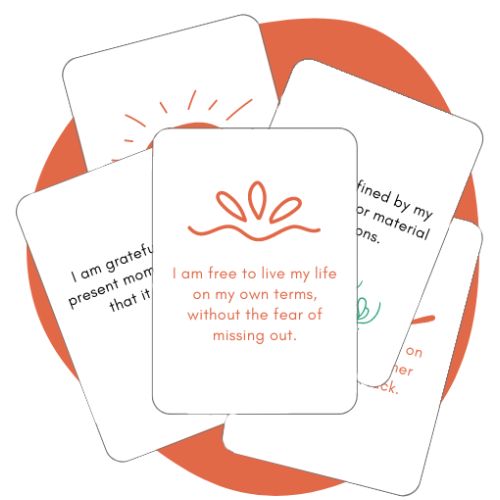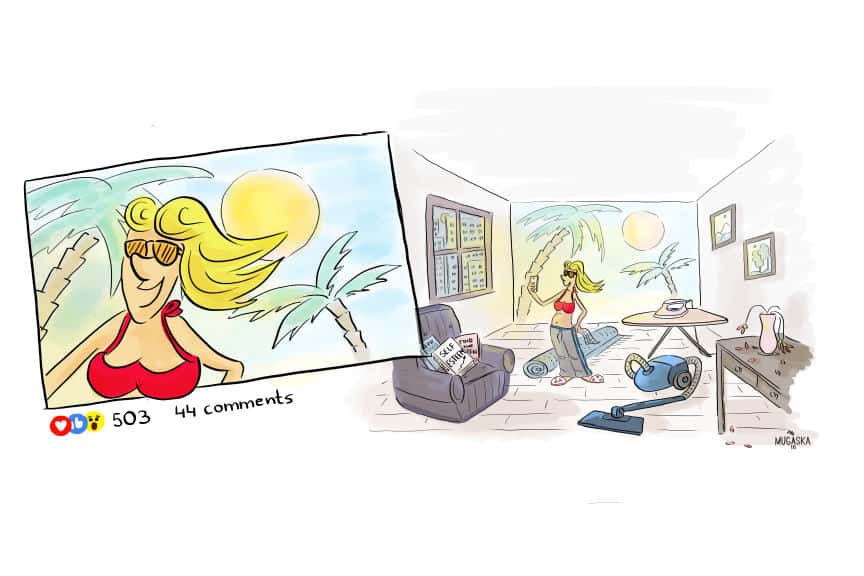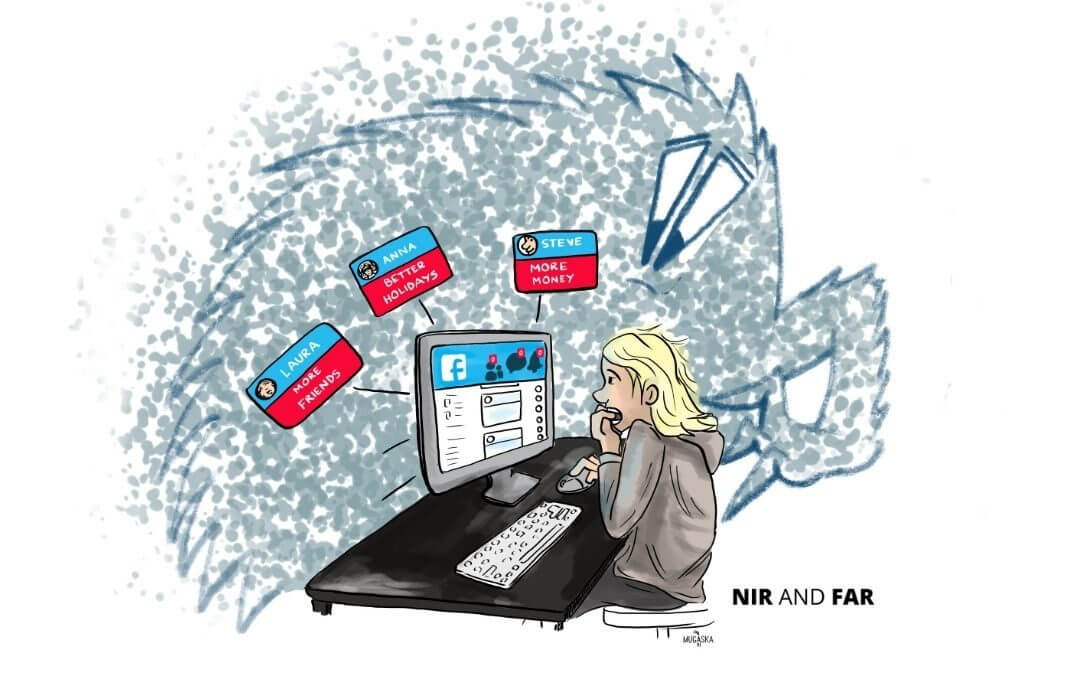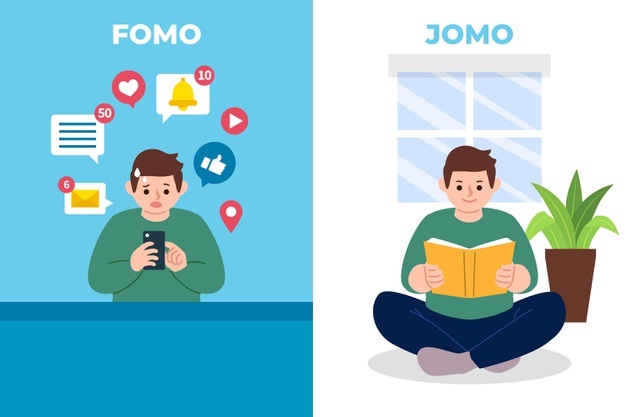Illustrations by Joanna Mugaska
Nir’s Note: This post is co-authored with Stuart Luman, a science, technology, business writer, and occasional FOMO victim who has worked at Wired Magazine, the Bulletin of the Atomic Scientists, and IBM.
“I wish that I could be like the cool kids,” goes the catchy hook for the hit song by Echosmith. The official video has been viewed over 132 million times on YouTube, perhaps tapping into something deeper than mere adolescent angst.
We all want to be like the cool kids.
What is FOMO?
FOMO, the “fear of missing out,” refers to the feeling of “anxiety that an exciting or interesting event may currently be happening elsewhere.” In 2013, the word and its definition were added to the Oxford English Dictionary. Today we have fomo stocks, fomo crypto and the debilitating symptoms of “major fomo”—but experiencing FOMO is nothing new.
Most people at one time or another have been preoccupied by the idea that someone, somewhere, is having a better time or leading a more exciting life. For those who skew towards such feelings, smartphones and social media have made it easier than ever to track what others are doing.
Of course, there is nothing wrong with wanting to keep tabs on people we care about. An important part of what makes us human is our need to be social. But recently companies have found ways to tap into this impulse to keep users coming back to their apps and websites habitually using what I’ve called the “Hooked Model.”
Whether social media induces FOMO or simply makes it easier to indulge in our feelings is up for debate. It’s not surprising that something as new and transformative as this technology would have complex implications on our daily lives, both positive and negative.
Free Morning Affirmation Prompt Cards
Improve your mindset and build healthier habits.
Your email address is safe. I don't do the spam thing. Unsubscribe anytime. Privacy Policy.

Research on the Fear of Missing Out
A study in Computers in Human Behavior featured a series of ten statements such as “I get worried when I find out my friends are having fun without me,” and asked participants to rate themselves from one to five on how well those statements correlated with their own lives. The study found that three-quarters of respondents (mostly college-age students) experienced FOMO. Those who scored higher were more likely to report lower life satisfaction and use social media immediately before and after sleeping, during meals and classes, and to engage in dangerous behaviors such as texting while driving. In a 2018 study in the Journal of Social and Clinical Psychology, limiting social media decreased loneliness and depression in a group of 143 University of Pennsylvania college students, where half were assigned to cut their social media use to 30 minutes per day while the other half continued their normal usage. After 3 weeks, the limited use group had significantly lower levels of loneliness and depression compared to the control group, suggesting a causal link. Films like the 2020 docudrama The Social Dilemma have reinvigorated the controversy over the harmful impact of social media.
Not all studies reach such negative conclusions. One study found shy and depressive individuals benefited from increased social media use and online relationships. Likewise, a paper in the Journal of Computer-Mediated Communication found a positive correlation between college students’ use of Facebook and increased life satisfaction, civic engagement, and political participation.
It’s clear that we can’t yet fully grasp how new technologies affect our psyches. Regardless, it appears that they are here to stay. Therefore, it is up to us as users to figure out where, when, and how often to use these products and services.
How to Deal with FOMO
Here are a few suggestions for keeping gadgets and FOMO in check.
- Relish feeling out of the loop. Great things are indeed happening out there and sometimes you’re not invited. Admit that you are missing out and there’s nothing you can do about it. In fact, one approach may be to savor the fact. Blogger and entrepreneur Anil Dash wrote about the “Joy of Missing Out,” a term he coined to describe the satisfaction of doing things on his own terms. Dash learned to find pleasure in JOMO after the birth of his son when he discovered the simple joy of getting home in time to give his son a bath and put him to bed.
- Take a hiatus from social media. Try staying offline for a day, a week, or maybe even a month. Examples abound of people cutting themselves off and waking up to the wonders of the real world. Steve Corona, former CTO of TwitPic, did just that. He took himself off social media for a full month. It changed his life. He read books, spent time with friends, meditated, ran three miles a day, and wrote a book. When he returned, he intentionally decided which sites he spent time on and which he didn’t.
- Use software to avoid succumbing to FOMO. Apps such as Forest for iOS, Space for Android, RescueTime for Windows, or SelfControl for Mac generate reports to help users see just how much time they spend online and set time limits. For those who need more radical solutions, Internet-blocking software Freedom or browser extensions such as Website Blocker or WasteNoTime block sites that cause unwanted distractions.
- Delete social media apps. It is not as radical as quitting Facebook altogether but is a quick and relatively easy way to reduce social media use when you are away from the computer.
- Timebox it. Make a weekly calendar and reserve a fixed amount of time every day to engage with social media apps and gadgets. Once you’ve schedule your time this way, social media no longer becomes a distraction, but rather an activity you had consciously planned to do.
 Clearly, what we see of others online isn’t a full representation of their lives. Instead, it’s personal social-media marketing, similar to the images of airbrushed models in fashion magazines that highlight and exaggerate only their most positive aspects. The inevitable disappointments, cringeworthy embarrassments, personal failures, and existential doubts are rarely seen in Facebook posts.
Clearly, what we see of others online isn’t a full representation of their lives. Instead, it’s personal social-media marketing, similar to the images of airbrushed models in fashion magazines that highlight and exaggerate only their most positive aspects. The inevitable disappointments, cringeworthy embarrassments, personal failures, and existential doubts are rarely seen in Facebook posts.
It’s also important to remember that most people experience FOMO to some degree and at some time. The uncomfortable emotion is normal and with the advent of social-sharing tools, increasingly common. However, understanding the feeling and finding positive ways to deal with it can help us be happier with our own lives without getting wrapped up in a fear that we might be missing out on what the cool kids are doing.
Related Articles
- Schedule Maker: a Google Sheet to Plan Your Week
- Habit Tracker Template in Google Sheets
- The Ultimate Core Values List: Your Guide to Personal Growth
- Timeboxing: Why It Works and How to Get Started in 2024
- An Illustrated Guide to the 4 Types of Liars
- Hyperbolic Discounting: Why You Make Terrible Life Choices
- Happiness Hack: This One Ritual Made Me Much Happier


